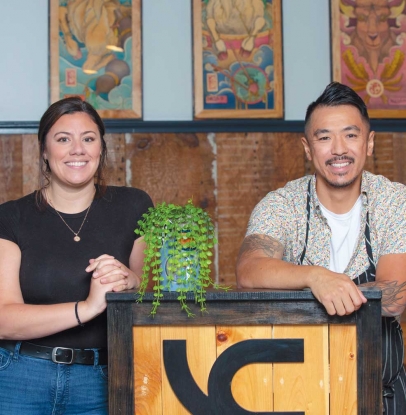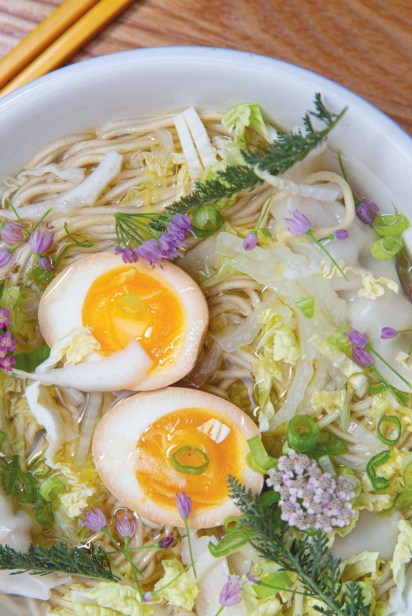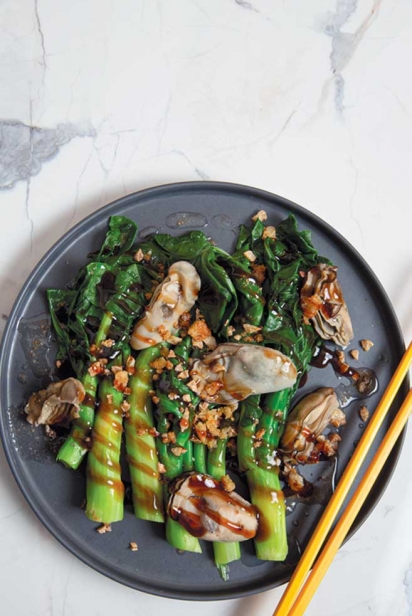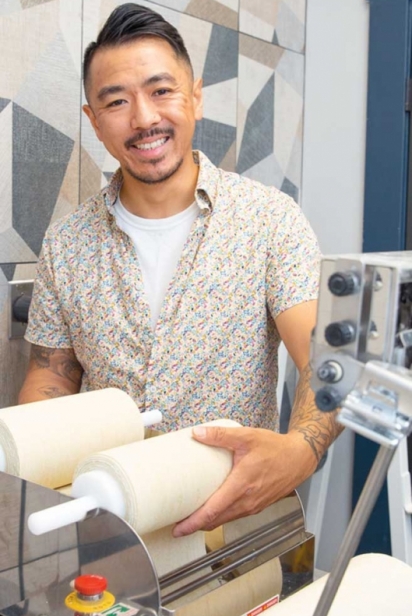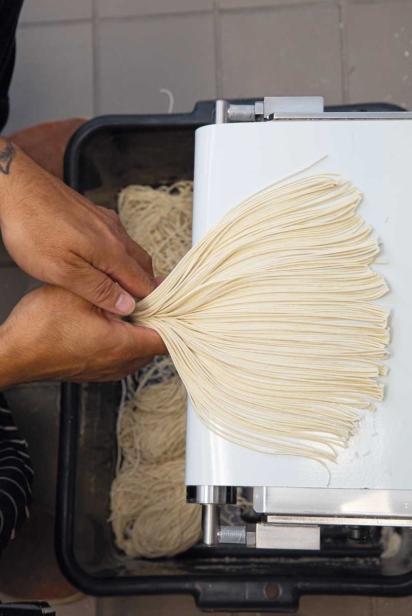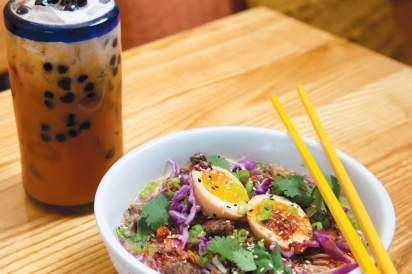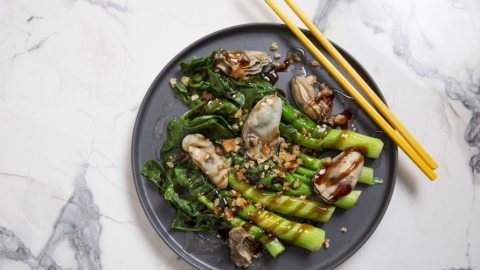Yagi Noodles in Newport
With Ramen Noodles Handcrafted Daily, It’s Time to Get Your Nood On!
The history of ramen noodles is akin to the story of Chef Basil Yu, whose parents came from China to run a restaurant called New Canton, in Manchester, New Hampshire. And despite his parents’ admonitions about how hard a restaurateur’s life can be, Yu’s career has been centered on cooking, doing so in restaurants around the country.
For the past few years, he has been specifically fascinated with handcrafted ramen noodles. Yu’s passion for ramen underscores the Chinese origin of something that has become a ubiquitous American food (especially among college students), but one that is universally thought of as Japanese.
Granted, the name “ramen” is Japanese, but it is adapted from a Chinese word meaning “pulled noodles.” Ramen history buffs have put forth various theories about the introduction of Chinese noodles into Japan, which include travelers from China and/or Chinese chefs serving them to Japanese nobles. But most ramen experts agree that, in the early 20th century, noodle stalls vended by Chinese immigrants living in Yokohama made them so popular that the first official ramen shop opened in Japan in 1910.
In fact, Chef Yu traveled to Singapore and to Tokyo for his ramen training. In Tokyo, the headmaster of the “ramen school” he attended had trained American chef and Japanese culture expert Ivan Orkin, whose ramen shops became quite famous in Tokyo and New York City 10 years ago. Yu also valued his experiences in Singapore for the variety of cuisines, including Chinese, Malaysian and Indian. He draws on all of those flavors and many more influences in his recipes.
After initial culinary training at the White Barn Inn (Kennebunkport, Maine) from 2006 to 2010, Yu first came to Rhode Island to work for three years at The Vanderbilt in Newport. That’s where he met Kodi Keith, now his wife and business partner.
In 2015, he became part of the opening team for The Break, a hotel and restaurant in Narragansett. It was there that he first tested out the customer appeal of fresh-made ramen.
“Monday night was ‘Noodle Night’ at The Break,” Yu recalls, “and more people came in then than on weekends!”
From that boutique luxury property, Yu and Keith traveled to the Dunton Hot Springs resort in Colorado, where they again created a “Noodle Night.”
“All we had ever offered there was fine dining,” Yu says, “but we teamed up with a brewery and started doing a ‘Noodle Night’ and it was as popular there as in Narragansett. The noodle dishes were complex, because of the different broths and toppings, but they were also quite simple.”
After moving through that world of high-end dining—using whole-animal butchery, foraged products, in-house ferments and wine pairings—Yu came back around to his mission of “sustainable hospitality” that would “place importance on the viability of how we care for the environment.” In addition, he and Keith wanted to start a family (their son, Roman, is now an 18-month-old toddler).
With both of their families back East, they moved from Colorado to Rhode Island in 2019 and started doing “Ramen Pop-Ups” at local breweries and other venues. They’ve since had a stationary restaurant, called Yagi Noodles, in three different locations in Newport, before landing at a fourth, more permanent, home in the Long Wharf Mall.
“There are a lot of small businesses in Newport, many with similar food,” Yu observes, “so we wanted to bring something different.”
The flour that they use for the ramen is a mix of hard and soft wheat, with no dyes and no additives (yellow ramen uses bleached flour and/or dyes). The flour is milled at Ground Up, in South Hadley, Massachusetts, and the grain is from farmers in Maine and New York.
“The dough is tricky to work with because it’s so dry, 28–32% moisture compared to 80% for bread dough,” Yu explains. “So we bought a machine that is made in Japan for such dough. That is the mixer. And there is another machine that rolls and cuts it.”
“We are not actually pulling the dough ourselves,” he continues, “but we needed a tool to get the result we wanted. A lot of consumers wouldn’t care, but we are still craft-driven, DIY, giving local support to growers and grinders.”
Yu attests to the fact that a lot of ramen shops in the U.S. are using dry commercial ramen, not fresh, and the noodles often taste the same at different eateries. Because of the whole-wheat flour and the freshness of the noodles, Yu’s ramen has its own special taste and texture (similar to fresh vs. dry pasta).
And then there are the aromatic, enticing broths, including the iconic Tonkotsu, a cloudy pork soup. In addition, Yu creates tongue-sparking toppings for the ramen dishes and plays Japanese or Chinese riffs on familiar sides, such as okonomiyaki Brussels sprouts (pan-fried). A variety of fillings enlivens the Chinese bao buns—Cantonese-style pork belly, lobster, gochujang fried chicken or farm mushrooms.
Cocktails, designed by Keith. are spirit-free at Yagi Noodles, but diners are welcome to bring their own spirits as add-ins (or wine or beer). Yagi will also have boba tea, with house-made tapioca bubbles.
Yu and Keith’s long-term goal is to have multiple restaurants with a strong hospitality focus—”not just another large [restaurant] group.”
“We’re really detail-oriented,” Yu emphasizes. “We want personalized service. We don’t want to lose the charm of a mom-and-pop shop.”
How could they go wrong with handcrafted ramen?
Yagi Noodles
20 Long Wharf Mall, Newport
401.324.5098; YagiNoodles.com
Tu–Sa 4–9 pm


